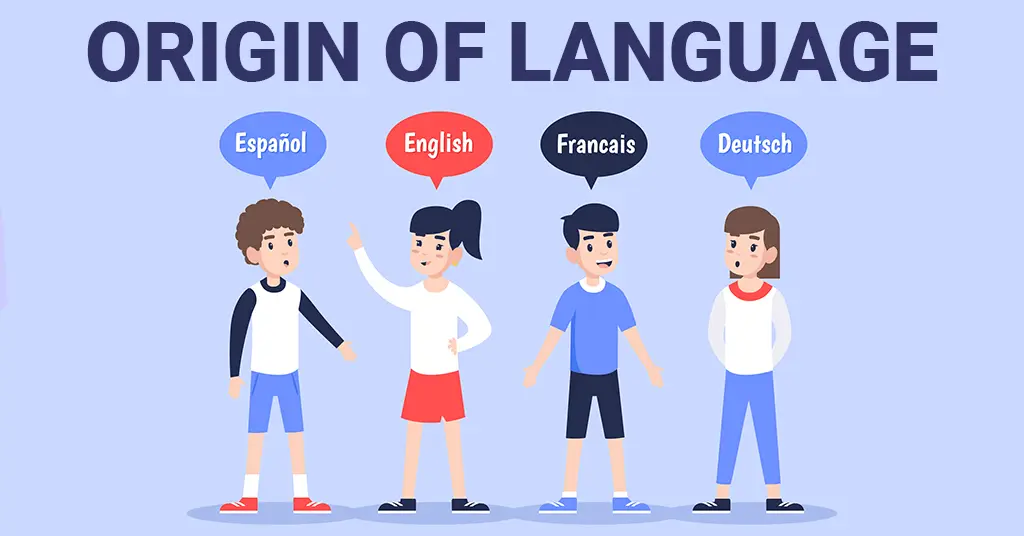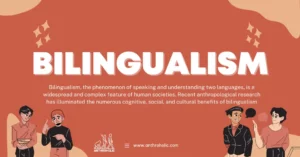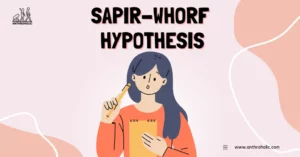AI Answer Evaluation Platform Live Now. Try Free Answer Evaluation Now
Origin of Language

In the beginning was the Word
Gospel of John 1:1
What was this word, though? Where was it said, exactly? And how did people start speaking it? The origin of language is one of, if not the biggest, scientifically accepted enigma.
How we progressed from animal vocalization (barks, howls, calls, etc.) to human language is an intriguing subject that may never have a definitive explanation. A single proto-language that steadily evolved and spread to many parts of the world may have been the source of all languages. Similar terms found in languages that appear wholly different can serve as proof. Regardless of the validity of this idea, can words change significantly enough to seem completely distinct from where they came from?
Will the similarity of a single word between two different languages indicate that they share a common ancestor? Can words like tik, which have a different look now, be their predecessors? The problem is studied by a subclass of linguists specializing in a collection of Native American languages. Many words have been rebuilt to their protoform by them. These linguists, known as Algonquianists, look for the roots of language.
The language has existed for over 150,000 years—however, the earliest linguistic evidence for writing dates to about 6000 years ago. As a result, the main events in language history are derived from theories and written records that are far more recent than the period that linguists research. But a simple question arises here: what is language altogether?
What is language?
Being exclusively important in social circumstances, language is a social phenomenon. Though it sometimes goes unnoticed, language is constantly developing and changing. Meaning: “Any means of expression or mental conceptions by any living being whatsoever and of communicating or receiving them from other living beings are considered to as languages.
Sapir says, “Language is a primarily human and non-instinctive method of communicating ideas, emotions, and desires employing a system of voluntarily produced symbols.”
Origin of Language
We inherited it from our forefathers, and now we are passing it on. But the mystery continues. Where did it all start? Based on a few fundamental presumptions, the origin of language can be divided into three categories:
- “Continuity theories” are based on the concept that because language is so complicated, it cannot have arisen from nothing among humans’ primate predecessors in its ultimate form. Instead, it must have evolved from earlier pre-linguistic systems.
- “Discontinuity theories” take the opposite tack, positing that language must have emerged relatively abruptly throughout human development because it is an exceptional quality that cannot be compared to anything found in non-humans.
- According to some ideas, language is primarily an innate, genetically programmed ability.
- According to some ideas, language is primarily a cultural system taught through social contact.
Max Müller, a linguistics scholar, provided a list of highly speculative views about the beginnings of spoken language in 1861.
According to some ideas, language is primarily a cultural system taught through social contact. Several theories support the idea of the origin of language. While many other historical scholars always supported the proposed approaches, they all lacked in some or different ways. Like they believe that language automatically developed once our ancestors found the most inventive way to connect sounds with meanings.
These theories are as follows:
Bow-wow- According to the cuckoo or bow-wow theory, which Müller credited to the German philosopher Johann Gottfried Herder, the earliest words were imitations of animal and bird calls.
Pooh-pooh- According to the pooh-pooh idea, the first words were emotional interjections and exclamations brought on by various emotions, including pain, joy, surprise, etc.
Ding-dong- Müller put out what he called the “ding-dong theory,” which holds that everything has an inherent resonance that vibrates and that man may have reflected this resonance in some way with his earliest speech.
Yo-he-ho- According to the yo-he-ho theory, the language developed due to coordinated rhythmic labor, with attempts to synchronize physical exertion producing sounds like heave alternating with sounds like ho.
Ta-ta- Despite being an idea that Sir Richard Paget first put up in 1930, it was not included on Max Müller’s list. [36] According to the ta-ta statement, people created the first words by imitating hand gestures with their tongues to make them audible.
The Evolution Of Language
So far, we’ve discussed several academic theories to explain how communication first developed; some explanations are more compelling than others. Let’s now focus on the development of human language to explore what insights we can get about the origins of language from this history.
Egyptian Times: It is possible to date the development of spoken language to Egypt’s 26th dynasty. During the reign of Pharaoh Psammetichus I, the earliest known human language experiment was conducted (The First). “Divine Source Theories” refers to some of the earliest theories about language. These theories held that the gods gave humanity the ability to communicate.
The Babel Tower: The Tower of Babel, a biblical tale that describes the genesis of the diversity of languages, sticks out. To make a reputation for themselves, the Babylonians built a massive metropolis and a tower “with its summit in the skies,” according to the book of Genesis. The Bible claims that when humankind was building the Tower of Babel, God became angered and gave people many languages to confound them and prevent them from communicating with one another. Then God dispersed these people and their new languages throughout the globe. The biblical story can explain the current language variation we observe in our contemporary society.
Greek Mythology: Another comparison involves the early humanity who spoke Zeus’ native language in Greek mythology. They hold that the God Vé, Odin’s brother, gave a speech to humanity as a gift. The Wa-Sania people of East Africa also believe that our ancestors once used a single vocal language. They went nuts and started speaking a new language after contracting a disease. And this led to the emergence of numerous languages.
Aboriginal Folklore: Another growing theory from Aboriginal Australian tradition is also covered in great length. An older woman named Wurruri allegedly passed away. Several other tribes of people gathered after she died to consume her body. After ingesting a separate part of Wurruri’s flesh, each tribe that attended the meeting spoke a different language. And this is how a language’s dialects develop.
Wrapping up
Didn’t there a lot to unpack with this subject? In our quest to comprehend the origin of language, there were numerous theories and analogies for us to consider.
Naturally, based on our research, many ideas contend with explaining the beginnings and development of language. Unfortunately, the conclusions these theories reached about the genesis of languages left a lot to be desired, given what we know about the wording of today. We still need to determine how and when language evolved at this point. However, we are aware that human interaction requires communication.
Given this, it is reasonable to assume that language and efficient communication are at the core of translation and interpreting. As a result, Day Translations is committed to giving you top-notch translation, interpreting, and localization services.



